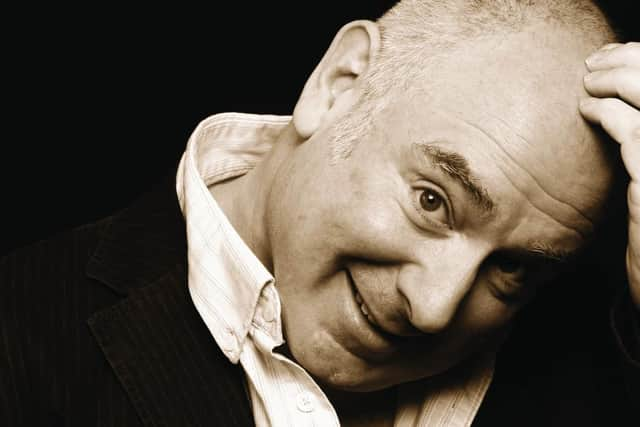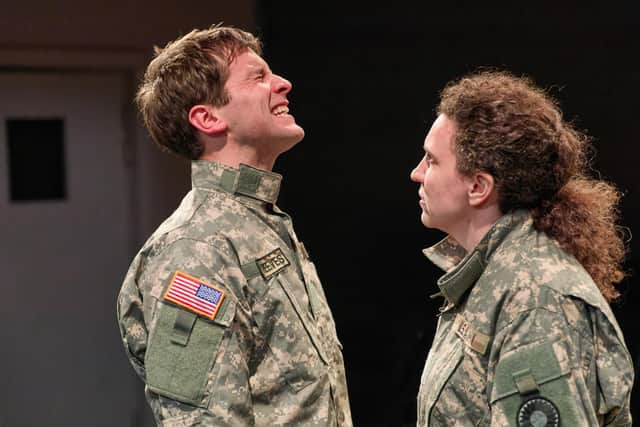Guy Masterson: ‘It is like some kind of crazy blackmail’
Guy Masterson at the Edinburgh Fringe is, for many of us, a bit like the legendary ravens at the Tower of London. Legend has it that, if he ever leaves, the whole Fringe will fall. Well, grab your hard hats, people, because even he has just about had enough. This year he is not even bringing any of his own productions.
“I am not taking the risk,” he says. “I am presenting two companies with their own money, but I am feeling their pain as keenly as if it were my own. This is not the right feeling with which to participate in the world’s greatest arts festival.”
Since 1994 and Playing Burton, Masterson has earnt a largely unrivalled reputation for quality theatre at the Fringe. “I have tried to put my 27 years on the Fringe into perspective and make some sense of them,” he says, “I can’t. I have presented over 150 shows, almost all of them at Assembly, a few at the Traverse and a few at Pleasance. Several have gone to the West End. I’ve been nominated for three Oliviers and won one. I have never done so with anybody else’s money other than my own or that of the companies I was presenting. I have never had funding, and I’ve survived by virtue of the box office I have generated. I have mostly worked with new artists, new works and ideas, and have inevitably rolled with the punches that the Edinburgh Fringe has thrown at us over the years. I might be the only independent theatre producer stupid enough to have continued for this long and survived to tell the tale.”
Survival is, obviously, even tougher for everyone this year, given the eye-watering rents being extorted by Edinburgh’s property-owning classes, but it was the Fringe Resilience Fund and the Fringe Society’s continuing abandonment of actual Fringe-makers in favour of pursuing their love affair with the controllable and the corporate with its gloriously meaningless jargon that lit Masterson’s blue touchpaper.
“I see ZERO ‘risk mitigation’. Things are the same as they always were. Reading about these grants being handed out to the venues who have very little risk given the basic guarantees that they pass on to the performers... makes me feel stupid. Pathetically gullible in fact.” I have known Guy for a long, long time, and I have never heard him like this. “Didn’t anybody consider a fund that could go to performers? The actual people without whom there would be no Fringe? Oh, but why would we need to think of them? If we build it, they will come! They always do!” I hesitate to mention that, yes, indeed, such a fund was suggested by some at the table, but shot down faster than an Edinburgh landlord can add an extra charge for clean sheets and a hot shower.
Pretty much all of Masterson’s Fringe successes down the decades have been with Assembly. William Burdett-Coutts set off a seismic change at the Fringe in 1981 when he created the first curated multi-venue at the Assembly Rooms. They are, of course, recipients of a not inconsiderable amount of resilience-boosting grant money. “Bill is a businessman, availing himself of all beneficial opportunities,” says Masterson. “I don’t blame him. I blame the nature of the grants, and how and who they were designed for. NOT A SINGLE THOUGHT FOR THE F***ING ARTISTS THAT TAKE THE RISKS.” There is a despondent pause.
“It seems strange to me, given my experience of the Fringe, that nobody has asked me for my thoughts from a producer/performer perspective,” says Masterson, momentarily forgetting that this Fringe Society does not really talk with mere people – at them, yes, with them, not so much. “Nobody asked me what I might do, if I were a venue, with my portion of the resilience funds to ease things for the performers. Well, perhaps, instead of making my venue look prettier, I might do something like waive the venue publicity charge or drop the rental from 40% to 35% or even 30%. THIS is where it might help the people who actually make the Fringe happen.


“All together: Rental 40%. Venue ticket commission 4%. Covid charge 3.7%. PRS 1.5%. VAT 20%.” He pauses for breath. “Then the fixed but compulsory costs: Fringe registration £400. Venue publicity charge £600. Venue dressing posters £275. Technical charges £1800. Total: £3075. Which means that performers are paying out nearly 80% of their potential box office EXCLUDING production costs, promotional costs and accommodation, the cost of which is utterly terrifying. It renders the whole thing useless from the outset. But we only became aware of this AFTER we registered and committed to come. Madness! It is like some kind of crazy blackmail. We are guaranteed to make a significant loss which could be catastrophically significant if a show fails critically.”
Shortly after our conversation, Masterson did get some good news from Assembly, who have used the part of their Resilience Fund grant allocated to “artist support” to halve their £500 + VAT charge for in-house publicity. Their application for further money to create some sort of guarantee against loss for performing companies was turned down.
One has to wonder how much the now half-price, in-house publicity services can do, given that the sheer cost of being in Edinburgh is having a significant impact on the number of talent and production spotters, writers and critics who might be expected to turn up. Given that the financials in Edinburgh for theatre are now very much “about how much you lose” according to Masterson, the Edinburgh gamble is taken almost entirely in the hope of it being a worthwhile launchpad. But how many reviews does it take to effect a launch?
“I am bringing two newbies to the Fringe this year. It’s a huge risk and they will lose money. But they will be absolutely brilliant in a brilliant bloody play. In raw terms, it means that they are buying what will be written about them. It’s an expensive way to do it.” So, I hesitate to ask, is there any way forward? “If the venues cap their costs at 50% there could be,” says Masterson. He completely dismisses my master plan for capping the size of an allowed Fringe venue at 400. Or cap the number of shows and have a first-come, first-in-the-brochure system? “It will cap itself with people like me not coming back.” he says. “The raven might yet fly...”


This year, Guy Masterson presents 9 Circles, Assembly George Square Studios, 1.30pm, until 29 August, plus a 20th-anniversary production of Horse Country, Assembly George Square Studios, 4.45pm, 8-29 August